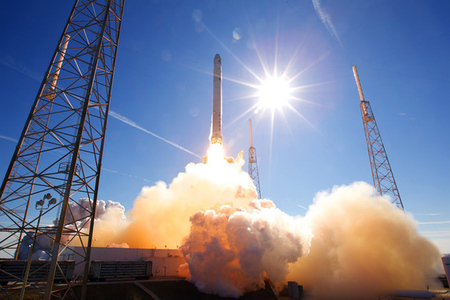
History was made yesterday when the first privately owned company did something that our federal space agancy, NASA, usually does. SpaceX docked its space capsule called Dragon on to the International Space station this Friday in order to supply it with various items from equipment to food. Never in our history has a business been able to deliver supplies to the station.
"There's so much that could have gone wrong and it went right," said Elon Musk, the man behind SpaceX. "This really
is, I think, going to be recognized as a significantly historical step forward in space travel - and hopefully the first of many to come."
This achievement was possible thanks to the joint NASA and Space X project. NASA astronaut Donald Pittit was the one who used the ISS's 58-foot robotic arm to catch the capsule.
"Looks like we've got us a dragon by the tail," he said, once he was able to lock onto Dragon's docking mechanism.

NASA was just as ecstatic as the young privately owned space company. While Space X, whose employees are around the average age of 30, were debating if it was finally okay to bring out the champagne (it's obviously not a good idea to be tipsy when dealing with a near $400 million project), NASA controllers were dressed-to-impress as they applauded the accomplishment.
President Obama is currently urging privately owned companies into orbit so NASA, who is losing funding, can put more of its focus on the bigger things. How big? How does a trip to Mars or mining an asteroid sound? Sheesh, with all of these advances going on, sci-fi writers might start running out of ideas! These ideas are happening during the end of the Space Shuttle era. Why, the American astronauts on the ISS are currently getting there by hitching a ride from Russia until we get our own wheels. . . um, I mean, thrusters again.
So, here are my final thoughts. A lot of people will overlook this event as just being, "meh." What does this have to do with them? Well, everything! Being a science fiction writer, I find it exhilarating to watch mankind prove a common belief in sci-fi being the mere precursor to sci-fact. While the times are tough here on "ground zero" (Earth), it always seems like space is a beacon of hope for our future. And to me, that's one of the elements I strive to dwell with in my stories. My personal favorite sci-fi stories have always covered the potential of mankind, whether it be good or bad. From post-apocalyptic worlds to thriving utopias, science fiction is a big social question mark. So, it's important for us sci-fi writers to keep up to date with both current progresses and failures. Just a thought. ^_^

No comments:
Post a Comment